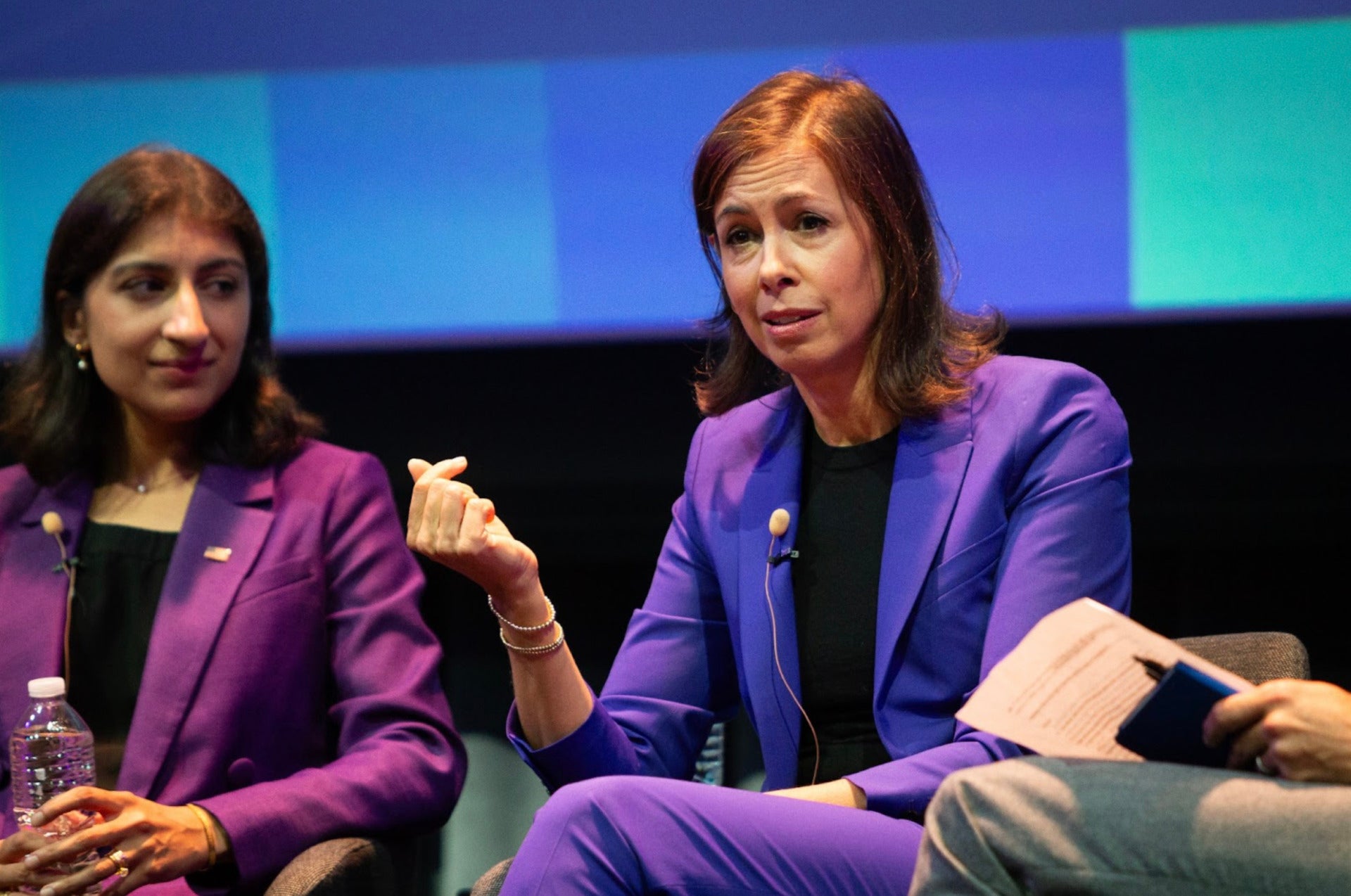“For three quarters of a century, the Aspen Institute has helped leaders throughout industry, academia, and government identify not just the greatest challenges we face, but the opportunities we have to join forces to overcome them,” said Federal Bureau of Investigation (FBI) Director Christopher Wray at this year’s Aspen Cyber Summit.
“And while the cyberthreats I want to discuss here weren’t even the stuff of science fiction 75 years ago, ultimately, today’s threats still boil down to an age-old conflict: the conflict between good and evil.”

In September, Aspen Digital brought the 9th annual Aspen Cyber Summit to Washington, DC, putting cybersecurity front and center for the government officials, business leaders, nonprofit advocates, and future defenders who are crucial to creating a safer world, online and off. The event had over 500 in-person attendees, more than 40 speakers and moderators, and 2,000+ livestream viewers. (Aspen Digital will hold the 10th annual Aspen Cyber Summit on November 18, 2025 in Washington, DC.)

The day featured an array of leaders in the field who addressed a range of priorities, from the current threat landscape to the impact of cyber on sports. Included in this lineup, for only the third time in history and first time in Washington, DC, were principals from the Five Eyes. These leaders from Australia, Canada, New Zealand, the UK, and the US spoke about the importance of the intelligence alliance in addressing the current threat environment as well as how external partnerships with the private sector, civil society, and academia support their work. To close out the day, the leaders of the Federal Trade Commission (FTC), Federal Communications Commission (FCC), and Consumer Financial Protection Bureau (CFPB) took the stage to share the regulator’s perspective on government efforts to improve the state of cybersecurity for consumers, from data security requirements to antitrust enforcement, and more.
Watch some highlights below, and keep reading for key takeaways from the day’s discussions.
The rapid growth of artificial intelligence (AI) brings challenges and opportunities in cybersecurity—especially in an election year
In 2024, about half of the world’s population in over 60 countries are heading to the polls to vote in national elections. It’s more important than ever that voters have access to reliable information, but deepfakes and online mis- and disinformation run rampant. Experts gathered at the Cyber Summit to offer their perspectives on key 2024 election outcomes, with a focus on AI’s influence.
“I think as generative AI companies are starting to develop and put out synthetic voice models, tools, like watermarking, that allow you to identify if something has been AI-generated very quickly and with relatively high degrees of accuracy are going to be increasingly important,” said Becky Waite, head of global response at OpenAI, in response to an audience question about identifying fake audio clips online.

“The opportunity is there to use these tools […] to do really creative things, to compare and contrast the things that you’re hearing. We are comparing things at vast scales in seconds to reach a determination on provenance, to reach a determination on intent, and I think we can therefore be confident that we will innovate our way to some of these solutions,” said Jonathan Luff, Chief of Staff at Recorded Future, about using AI tools to fight AI-generated misinformation.
The public needs to not only care about their own cybersecurity but also take action to protect themselves and their communities.
Craig Newmark, founder of craigslist and craig newmark philanthropies founder, launched a new cyber awareness campaign at the Summit. A PSA-style initiative, Take9 encourages members of the public to take a nine second pause and think before clicking, downloading, or sharing. The campaign is funded in part by Newmark’s pledged $100 million donation to bolster the United States’ cybersecurity.

Newmark expressed his belief in cybersecurity as an act of patriotism: “We all should do what we’re capable of doing. […] When I was raised in the 1950s, patriotism was a normal and expected thing. And that’s what we’re talking about now: patriotism as a real and vital thing.”
Harry Coker, the White House’s National Cyber Director, echoed Newmark’s sentiments: “Cybersecurity applies to folks all over the country. Cybersecurity is not a big city problem, it’s not a national problem, it’s an every one of us problem, regardless of where we live or what we do for a living. It impacts every aspect of our quality of life. Individuals have a significant responsibility to do the right thing.”
Cybersecurity doesn’t just affect people working in government or technology—it’s important for everyone: athletes too.
When you think cybersecurity, the first thing that comes to your mind might not be the Olympic and Paralympic Games, or the National Hockey League (NHL), but these organizations are just as concerned with cybersecurity as governments, nonprofits, and other public institutions.Eric Tysarczyk, senior vice president at NHL, highlighted the opportunities that new technology has brought to the world of sports: “What excites me is the diffusion and evolution of technology that we’re using. The different distribution channels, whether it be streaming to watch a game, or whether true fans can really get data and information from the players—not just social media, but their performance data—and how all that comes together. It’s something that really excites us and something that opens up different revenue streams for us.”

Jaia Thomas, founder of Diverse Representation, celebrated the opportunities that social media provides to athletes to build their own online brand and express themselves more as individuals. On the flip side, she also expressed some dread about how many athletes might not necessarily know what they’re doing online. “Professional athletes have a lot of influence on society. […] If they’re hacked or if their personal information is at risk, there’s a much higher risk there and a lot more to lose than the average person,” Thomas said.
The importance of cybersecurity applies to the production of sporting events as well, perhaps most of all for the world’s foremost multi-sport event: the Olympic and Paralympic Games. “To put it in perspective, it is like running and coordinating seven Super Bowls a day for about sixteen days straight,” said Reynold Hoover, CEO of the LA28 Olympic & Paralympic Games. “The implications of cyber to that: it’s not just the fan who worries about the ticketing website getting hacked or some other event part of the games. There are so many applications of technology in the games. Think of timing. […] Think about accommodations and transportation and all the things that make the games happen, not just for the fans but the athletes as well.”
Watch the full livestream of the event on our YouTube channel, and follow Aspen Digital on X/Twitter and LinkedIn to keep up with their work and get updates about the next Aspen Cyber Summit, which will take place on November 18, 2025 in Washington, DC.


